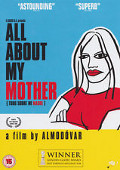
Directed by
Pedro Almodovar
97 minutes
Rated M
Reviewed by
Bernard Hemingway

All About My Mother
Synopsis: Manuela (Celia Roth), a single mother, loses her only son to a car accident. She decides to find the long-since-gone father (a transgender, now calling himself Lola) to tell him. She revisits the scene of her own earlier life and along the way, meets some old friends and makes some new ones.
Writer-director Pedro Almodóvar allegedly was miffed that he did not pick up Best Film at Cannes in 1999 with this film, leaving no doubt as to his own estimation of it (he did, somewhat surprisingly given the sexual content, win the Oscar for Best Foreign Film). Whilst it is probably his most polished film yet and evidently the work of a very skilled auteur, I have some reservations.
Few people will be unfamiliar with Almodóvar’s style as he has an extensive back catalogue with a distinct and consistent subject matter and visual treatment – in a nutshell, sexually transgressive themes rendered with a trash/camp kitsch aesthetic. What makes him an auteur rather than a sexploiteur is his analytic intelligence and skill for characterisation which often produce some very entertaining filmic results. On the other hand, some of his films tend to be rather over-familiar variations of his fairly limited thematic palette. All About My Mother is both raised to splendid heights by the former aspect and brought low by the latter.
Unquestionably it is a finely crafted film, both multi-perspectival and intimate, with some memorable scenes (the car accident in the rain, the Fellini-esque segment with the prostitutes), yet just as Almodóvar's camp sensibility tends to undermine his aspiration to the tragic as found in 1950s melodramas such as Douglas Sirk’s Imitation Of Life or Written On The Wind. The director’s sense of irony, black humour and love of the eccentric, all invariably subvert the unrelenting sentimentalism of the classic melodrama. This is not in itself the weakness here - that stems principally from the narrative excess which parallels Almodóvar’s trademark visual clutter. Many of the narrative elements are largely gratuitous and, despite being of standard length this is one of those films which never seems to end as the director wrings yet another chapter out of his story (one loses track of how many times Manuela tells someone that her son is dead). A judicious eraser and pair of scissors may well have earned him the Palme D’Or.
Cecilia Roth, as the beleaguered mother-ideal is compelling in the central role but the length of the film takes its toll on her as she moves through a rather astonishing set of experiences, increasingly with little more than dream-like acceptance. Marisa Pederes as the aging starlet, Huma, is also wonderful but suffers from overexposure by the end of the film. The result for the viewer is flattening of character and a kind of emotional numbing which, of course, is antithetical to the aim of the “woman’s film”, which is to have jolly good cry.
Almodóvar himself avows this film to be a homage to real women, ideals of women, and women who represent women. I can’t say that in that respect I am much wiser (and one wishes that he could have found a more effective actor to play the role of Lola), but at its best All About My Mother is a genuine celebration of polymorphous perversity and the errancy of sexual desire.

Want more about this film?


Want something different?




